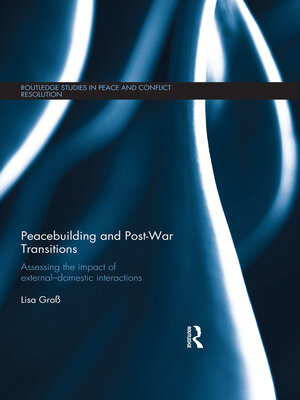Peacebuilding and Post-War Transitions
ebook ∣ Assessing The Impact of External-Domestic Interactions · Routledge Studies in Peace and Conflict Resolution
By Lisa Gross

Sign up to save your library
With an OverDrive account, you can save your favorite libraries for at-a-glance information about availability. Find out more about OverDrive accounts.
Find this title in Libby, the library reading app by OverDrive.



Search for a digital library with this title
Title found at these libraries:
| Library Name | Distance |
|---|---|
| Loading... |
This book asks how, and under what conditions, external-domestic interactions impact on peacebuilding outcomes during transitions to peace and democracy.
Why do so many peacebuilding interventions in post-war states result in stalled transitions despite heavy international support? This book suggests a new interaction-based explanation for this puzzle and proposes an 'analytical framework of peacebuilding interactions'. Based on eight cases of peacebuilding interactions, it demonstrates that the limited rationality of the actors involved in external-domestic interactions influenced the post-war transition results in Kosovo. Drawing on interviews and focus groups, the insights build on the process tracing of peacebuilding reforms in the area of Local Governance and Police Reform, with a specific focus at the local level. Through an in-depth analysis of peacebuilding negotiations, this book shows how peacebuilders' use of ad hoc interaction tactics – intended as heuristics to simplify decision-making in overly complex post-war environments – have the unintended effect of offering domestic actors additional leeway to prioritise their domestic agenda, often at the expense of achieving full democratisation. The resulting consequences of these actions mean that, even in highly resourced interventions, such as those implemented in Kosovo, stalled transitions become one of the most likely outcome of the peacebuilding process.
This book will be of much interest to students of peacebuilding, war and conflict studies, European politics, security studies and IR in general.







